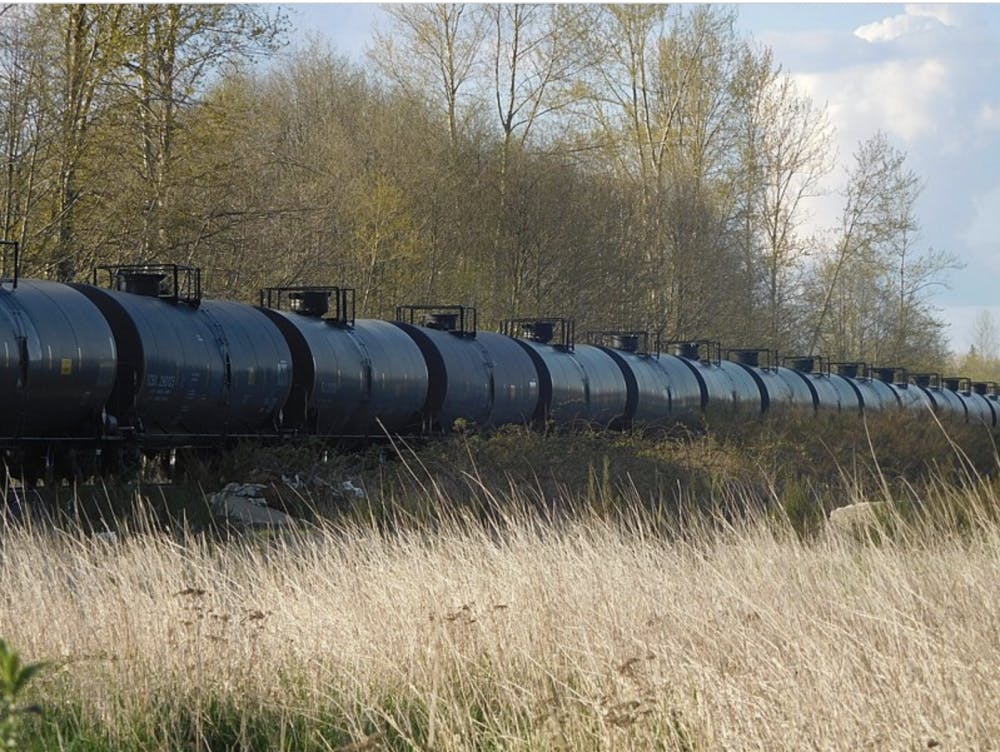Environmental activists, union workers, industry representatives collaborate on the plan.

As the climate crisis grows more serious, the Whatcom County Council has reviewed new amendments to tighten regulations on the county’s largest emitters of greenhouse gasses, Cherry Point Refinery.
The amendments will change Cherry Point’s zoning code, which regulates the operations allowed on any given piece of property, according to council records.
Cherry Point is home to several fossil fuel industries, including Washington state’s largest oil refinery, operated by British Petroleum. In 2019, the three largest companies at Cherry Point emitted a combined 4.24 million metric tons of greenhouse gases, according to the Environmental Protection Agency.
The industries active at Cherry Point employed 3,320 people in 2019, with an average annual salary of $110,690 –– over twice the average across the county –– according to a report by Hart Hodges, director of Western's Center for Economic and Business Research
The Whatcom County Planning Commission recommended amendments to the County Council in August. Those recommendations then went to the Joint Stakeholder Group, which is made up of union workers, environmental activists and representatives of the oil industry, according to the Council’s agenda.
The Joint Stakeholder Group is working collaboratively to revise the Planning Commission’s recommendations to ensure all groups have a say in the amendments. Once the group comes to an agreement, these amendments will be proposed to and voted on by the Whatcom County Council in coming meetings, according to council documents.
Over the past decade, several companies proposed fossil fuel industry developments in Whatcom County such as the Gateway Pacific Coal terminal and the gas pipeline, said Alex Ramel of Stand.Earth, an environmental advocacy group. Developments like these would drastically increase Washington’s greenhouse gas emissions, Ramel said.
“All of those would have had significant impacts on quality of life in our community, on public health and safety,” Ramel said. “But what we kind of figured out is that this is an area that is going to have these kinds of proposals, likely again and again unless we change the rules so that they wouldn't be allowed.”
According to British Petroleum’s website, one of the operations at Cherry Point is refinement –– the process of turning raw materials such as crude oil into usable petroleum products such as fuel.
Another operation is the transshipment of fossil fuels, where Cherry Point acts as an intermediary for shipping fossil fuels, according to the council meeting. When a train carrying fossil fuel stops at Cherry Point to simply transfer the cargo to a ship or other mode of transportation, that is considered transshipment.
Eddie Ury, who is part of the environmental advocacy organization RE Sources, presented the draft. “Essentially, the subject of this proposal is transshipment and transshipment capacity,” Ury said.
Controlling transshipment is important to protecting the environment because the higher the number of trains or ships traveling in and out of Whatcom County, the higher the risk to safety and the environment, according to a report produced by researchers at Cornell University.
One of the risks associated with the transshipment of fossil fuels is a spill resulting in ocean or ground contamination, fires and loss of life, according to a report produced by researchers at Cornell University.
The county and state do not have jurisdiction over transshipment, according to the U.S. Constitution, making regulation difficult.
The county does have jurisdiction over property zonings, so by amending the code regulating Cherry Point’s zoning, the county can regulate transshipment by proxy.
With an aim to reduce Cherry Point’s greenhouse gas emissions, the amendments will limit the scope of use for new facilities and developments within Cherry Point, according to council documents.
Councilmembers are primarily concerned with how the county will measure facilities’ transshipment capacity.
When the amendments go into effect, a company will have to apply for a conditional use permit whenever it seeks to increase its transshipment capacity, which the county oversees, Ury said. The county will then be able to approve or reject the permit.
The current draft stipulates that a third-party engineer hired by the companies at Cherry Point will analyze and report the intended use and transshipment capacity of any given facility. If results of this report show an increased transshipment capacity, it would trigger the need for a conditional use permit.
Councilmember Rud Browne took issue with this.
“Given that the report will be given by someone who makes a living by providing these reports to the industry, I think that’s inherently problematic,” Browne said. “I’m not supportive of any regulation that allows any industry, not just at Cherry Point, to say we will disclose what we think you need to know and we will limit stuff that we think is proprietary.”
Councilmember Carol Frazey agreed with Browne.
Councilmember Ben Elenbass argued that most industries are monitored that way, and the county can trust licensed, professional engineers to calculate the capacity accurately and with transparency.
Browne said he wants the trigger point for a conditional use permit to be simpler and more direct than measuring capacity. It should be an increase in oil-by-rail traffic that triggers the conditional use permit and broadened to all natural gases, not just oil, Browne said.
“If you’re not bringing in more stuff, you’re not increasing transshipment,” Browne said. “It’s the act of transshipment –– not the capacity –– the act of transshipment that increases the risk to the community.”
The Joint Stakeholder Group will continue to develop a method of evaluating transshipment that works for both parties, Ury said.
“I think we can come up with a way [to evaluate facility capacity] that is auditable, and it can be validated and still protect what we consider business proprietary and critical information,” said Brad Brown of Phillips 66, another oil refinery operating at Cherry Point
Once the stakeholder group returns the revised proposal, the council will proceed from there.
Ramel highlighted the importance of working on a local level to address climate change.
“Climate leadership in communities like ours can set an important example that other communities, I believe, will follow and are following,” Ramel said. “Local governments are a place where we can get stuff done in this space where we can make a difference.”





